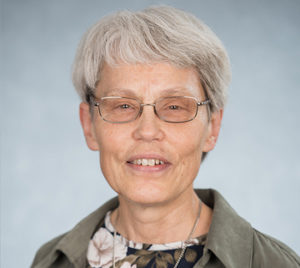Second Sunday of Easter
April 8, 2018

Readings:
Acts 4:23-35 1 John 5:1-6 John 20:19-31
Recently I had a bad cold, followed by a strep throat and then a mild viral lung infection. While fortunately none of these caused any serious problems, any illness is a blunt reminder that we live in a world where other creatures – not all of them friendly – are constantly encroaching upon us. In fact, in recent years researchers have discovered that we live literally in a sea of bacteria, fungi, and viruses that not only fill the soil, air, water, and every surface around us but also inhabit every corner of our bodies, inside and out. Although there are clearly germs that are enemies to our health, the vast majority of this highly diverse community of tiny creatures are either neutral or beneficial for us. Thus, rather than automatically assuming that our billions of microbial companions are enemies, we do much better if we nurture the health of the ecosystems of which they are members. Healthy and well-balanced ecosystems, both inside our bodies and in the world around us, carry out many essential functions for us while also providing the best defense against dangerous intruders.
Our scripture readings today also deal with issues of balance, defense, and intrusion. The most shocking image is that of Jesus inviting Thomas to put his hand into his wounds. It is an image of an intrusion into a person’s body by a path that is already the result of a flesh-rending violation. It almost needs one of those TV warnings: “Do not try this at home!” Yet when Jesus invites and welcomes this invasive touch, he transforms it from a violation into an event of communion. This is the amazing transforming power of the resurrection: everything, even the most egregious of human trespasses, is reconfigured in the communion of Christ’s body. It is as if Jesus is, in the fullness of his being, the completely balanced ecosystem that is able to include and cherish every member, even those who at first seem most undesirable.
The first letter of John puts it this way: “This is the one who came through water and blood … not by water alone, but by water and blood.” Just as in natural ecosystems there cannot be abundant life without the balancing effect of death, so in Jesus’s resurrection both the water of verdant life and the blood of sorrowful death are lifted up as integral dimensions of his being. In our own natural lives we walk each day among dangers of encroaching illness, humiliation, violence, and threats of death, and there is not one of us who can complete this journey unscathed. Yet insofar as we walk with the resurrected One as our companion, even that which causes us harm will be taken up into his greater story of victorious life and joy. This is our faith, which must carry us through the days when pain and destruction appear to be outbalancing the forces of good in the world. In the end, the “ecosystem” that is Christ’s body will not fail to do its work of radical inclusion and ultimate healing.
The readings from Acts gives us a glimpse of what that Christ-ecosystem would look like, if we lived it to the full in our human social world. All would be welcomed, all would have their place and their special way of contributing, all would receive what they need to live and flourish. When we read this we tend to think of it as a very naïve image, since in our experience no human community has ever lived this idyll with such simplicity for more than an hour or two at a time! Indeed, even the healthiest ecosystem is in constant flux; the balance that ultimately prevails is only maintained by a continual dynamic process of slipping off balance and finding the way back. So it is in our life as Christ’s body, as well. The resurrection does not save us from the costly struggle to live rightly, but it does assure us that staying in the struggle, with Christ our companion, is already a living expression of his victory.
Sr. Mary Frohlich, RSCJ
Professor of Spirituality